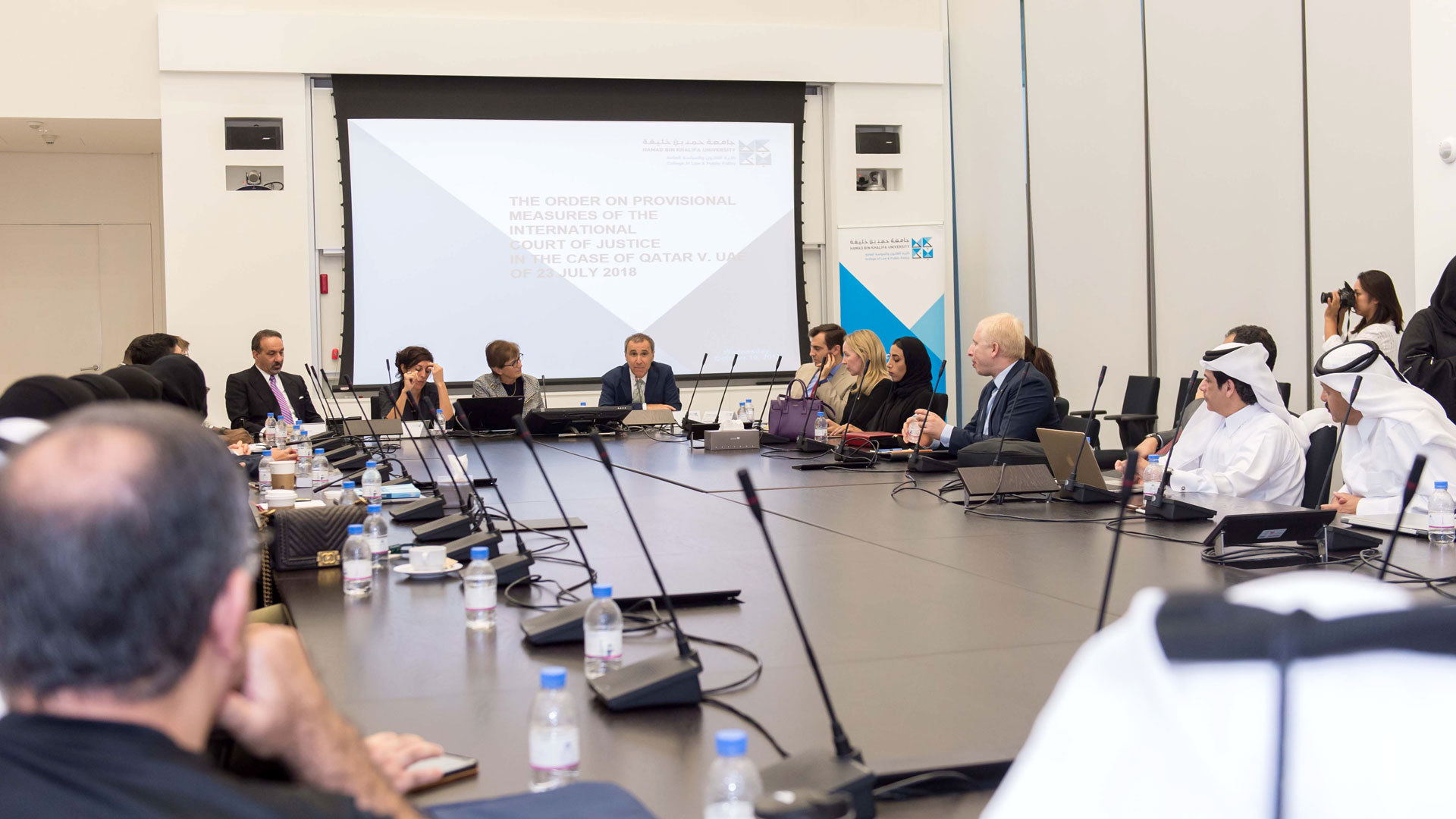Bringing real-world current issues to the table for discussion is part of the learning process at Hamad Bin Khalifa University’s (HBKU’s) College of Law and Public Policy (CLPP). An open forum with experts enables students and the public to learn about contemporary legal matters from a range of perspectives.

With this goal in mind, CLPP recently hosted a colloquium featuring international law and international relations experts, chaired by Susan L. Karamanian, Dean of HBKU CLPP. Participants discussed the domestic and international legal implications of the Order dated July 23, 2018 on provisional measures of the International Court of Justice (ICJ) in the June 2018 case, State of Qatar against the United Arab Emirates (UAE).
“We selected this topic for three reasons: First, its significance to the country and the region; second, the fact that the ICJ became engaged in a matter dealing with a major, multilateral human rights treaty to which Qatar and the UAE are parties; and third, the significance of Qatar’s decision to seek enforcement of the treaty before the ICJ, the principal judicial organ of the United Nations,” Karamanian said.
In June 2018, under the International Convention on the Elimination of All Forms of Racial Discrimination (CERD), Qatar requested that the ICJ put in place provisional measures to protect Qatari citizens who were expelled from the UAE following the blockade imposed upon Qatar 12 months previously. The ICJ entered a provisional order in July which found the UAE to be in violation of CERD, and outlined requirements to uphold the rights of Qatari citizens who were forced to leave the Emirates. These provisional measures are: (1) the UAE allow mixed families be reunited; (2) Qatari students affected by the measures be given the opportunity to complete their education in the UAE or obtain their educational records if they wish to continue their studies elsewhere; and (3) Qataris be allowed access to tribunals and other judicial institutions in the UAE.
“This is not Qatar’s first time before the World Court,” Karamanian said. “There was the earlier case of Qatar-Bahrain, a maritime delimitation and territorial dispute that the ICJ settled. The Court is accustomed to dealing with boundary disputes, and it has recently been asked with greater frequency to examine cases falling under human rights treaties, which raises interesting treaty interpretation and factual issues.”
The role of ICJ in human rights cases, and in relation to the Order itself, was discussed at length at the colloquium which featured Steven Ratner, Bruno Simma Collegiate Professor of Law, University of Michigan Law School; Eleni Polymenopoulou, Assistant Professor, HBKU Law; and Mehran Kamrava, Professor and Director of the Center for International and Regional Studies at Georgetown University in Qatar. In the audience were members of the local community, including Swedish Ambassador to Qatar, Her Excellency Ewa Polano.
Professor Ratner focused on the Order’s requirement that neither party aggravate the situation. He gave a detailed analysis under international law about the duty of non-aggravation. Thereafter, Professor Kamrava put the Order in its geopolitical context with a focus on the events giving rise to the blockade, and developments since then. Professor Polymeopoulou addressed the Order and the decision concerning the applicability of CERD to the specific conduct of the UAE.
Audience members got the chance to pitch questions to the panelists. One of the attendees asked: “If one government denigrates or defames another country’s government over Twitter, would that be considered aggravation?”
The informative and unique colloquium was close to standing room only. It reflected what CLPP does best. “Our collaboration with both local and international academic institutions enables us to gain crucial local and global perspectives on the implications of the UAE’s boycott, and the impact it has had on Qatari citizens who were living and studying in the country,” Polymenopoulou said. “The College is privileged to be able to present, and benefit from, the wealth of expertise of all of its participants at the panel. CLPP continuously strives to foster open dialogue as part of the College’s – and indeed the University’s – mandate to engage in meaningful discourse.”





